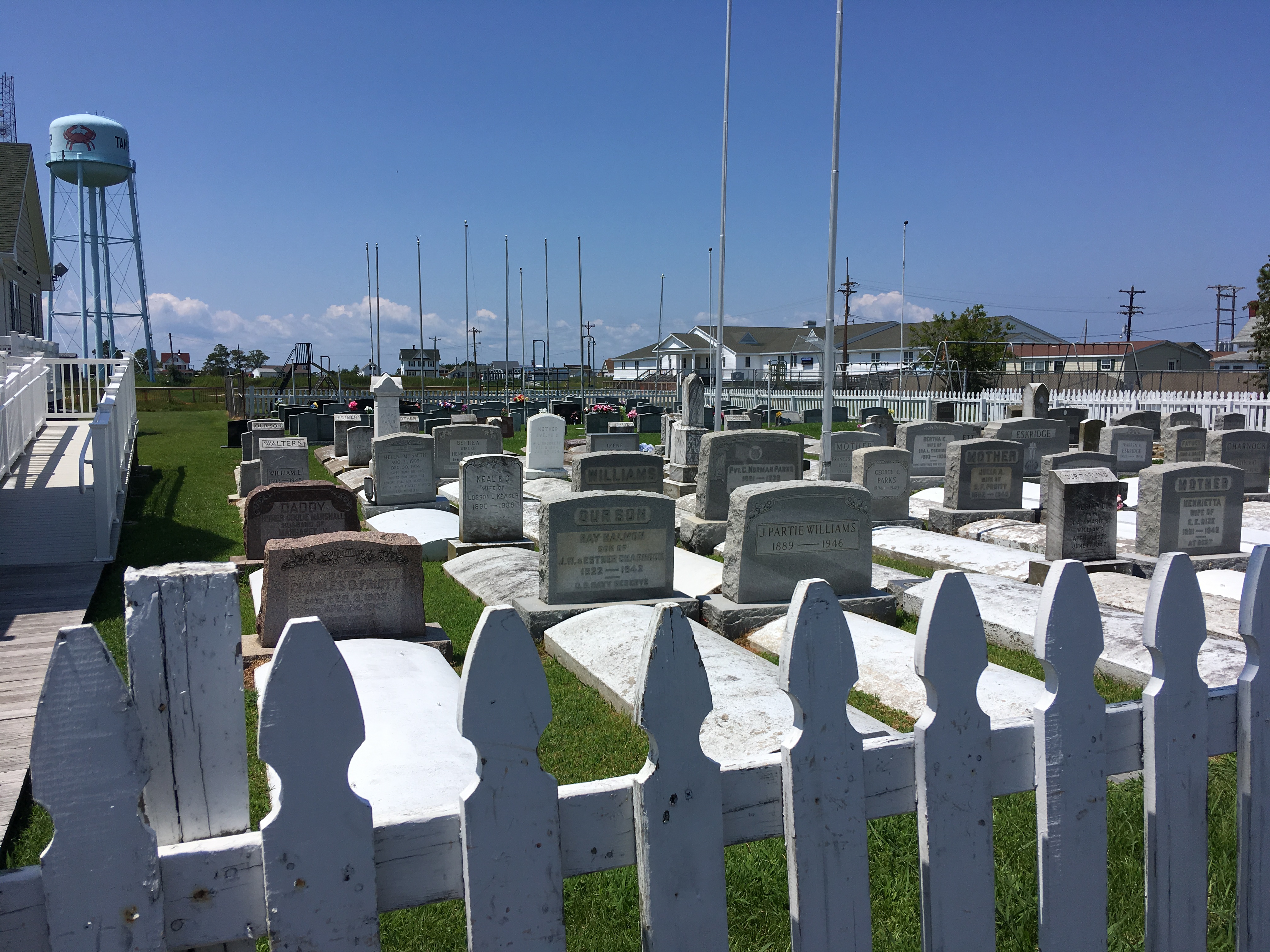
Today I finally visited Tangier Island. Not Tangiers: Tangier. A 400-year-old fishing community in the Chesapeake Bay, cradled by the states of Maryland and Virginia.
Let me backtrack. Years ago when I was teaching English composition one day in a darkened room at a community college in Tennessee, a film that I was given to present was American Tongues. The single thing I remembered from it was the dialect of English spoken in Tangier Island, Virginia. Some vowels were lengthened and turned into diphthongs, while others were corrupted with a broad American “r” sound. Some consonant sounds, like /th/, disappeared into others; /th/ became /d/. The rhythm of the language had a swing to it like the arc of an ancient sailor’s peg-leg. Some phrases became unintelligible to me, a non-islander. I wanted to hear this language. But Tangier seemed as far away as Tangiers; I never made it to North Africa and I never expected to visit Tangier Island either.
However, decades after I heard that lilting speech in the film, I
had a few days to spare after a trip to Washington, DC, and decided it was now
or never.
So it was that I showed up at the #11 slip at the wharf at Onancock this
morning, on the Eastern Shore of Virginia, to take the ferry for the 1-hour
ride into the Chesapeake Bay to Tangier. I didn’t actually have a ticket; I was
on the waiting list, and there were two couples ahead of me. But this day I was
alone, so I won the lottery and got the single free seat on the boat. The weather was perfect and the bay was calm.
When I got there, I found a village of about 450 souls living quietly, with
only a few surnames and several cemeteries packed with ancestors’
gravestones. People get around by
bicycle or scooter or golf cart, as the few roads are not wide enough for
cars–and why would you need them on such a small island, anyway? Three or four
restaurants serve the catches brought in by the fishermen every day–the crabs
and oysters and actual fish. Tourists perch on little open-air electric surreys
driven by tour guides. Tiny crab shacks
where the catches are cleaned line the rickety board wharves.

On the plus side, I got to hear the dialect. Most islanders will speak normal Tidewater Virginian English to an outsider, but in a relaxed mode and speaking among themselves will lapse into their dialect. My surreptitious recording of an islander speaking to another will remain an unpublished treasure.
But on the negative side, I may never get to go there again because the island itself is facing a very uncertain future environmentally, culturally, and economically.
Let’s start with the last problem: According to the people I spoke with on the
island, Virginia makes it too costly and too difficult to get commercial
fishing licenses, and people who want to come to Tangier cannot afford those
licenses. In addition, many in the younger generation are leaving the island in
order to make a living. Many of the crab shacks are abandoned and sliding into
the Chesapeake. There are older men around the village, but very few in their
20s or 30s. I was told there are no watermen under the age of 40 crabbing or
oystering from Tangier these days.
Because the men of Tangier have been watermen for generations, their culture
revolves around crabbing, church, and sports. For many, crabbing is the only
skill they have and the only way they want to live. I asked one man if the
islands have good representation in Congress, and he shrugged, “…promises.”
But the biggest threat to Tangier is global warming. The island is shrinking in land mass as the ocean rises around it, and neighboring islands have already sunk beneath the water of the bay. The people on Tangier know they don’t have long before their houses crumble as well. Soon they will be forced off to the mainland. Oddly, however, the “canaries in the coal mine” are quick to inform a visitor that the island is shrinking, but they won’t name the cause, and the only political signs I saw touted Trump, who denies global warming.
Scientists give Tangier 25 to 50 years before it will have to be abandoned. It was about 25 years ago that I first heard of the island. I’m glad I visited today because in another quarter century, it is likely not to be there at all.
An amazing trip, thanks for bringing us along, I can taste the salt, feel the breeze, hear the waves. Wonderful, even the difficult parts.
LikeLike
Em, enjoyed your great write-up on Tangier Island. We used to routinely fly to island from DC in our little Piper airplane. We would unload our bicycles and explore the place from one end to the other. The local dialect is something straight from the immigrants in colonial America…mesmerizing to hear. There are no cars on the island, just golf carts and golf cart-sized garages. And free range cats, everywhere. You undoubtedly saw where most Tangierines (sorry…couldn’t resist) bury their loved ones, right in their front yards. The graveyard has long been full. You probably also noticed there are a few prominent families whose last names appear on a disproportionate number of the headstones. Regarding the Tangiers economy, severe over-harvesting (and farm runoffs) destroyed the oyster stocks and shut down the traditional oyster industry all around the Bay. It is currently being replaced with oyster farming. Tangiers is indeed like a time capsule whose time may be nearing the end.
LikeLike
Yes, it seemed to me that the way of life on Tangier Island has already irrevocably changed. The rest is afterthought. But it was a fascinating visit and I’m glad I got there. Can’t believe it’s been 6 years, though.
LikeLike